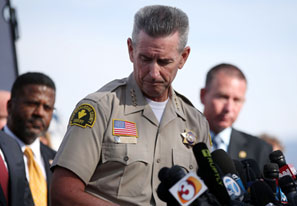
Yesterday’s attack on the Inland Regional Center in San Bernardino, California—in which 14 were killed and 17 wounded by a married couple armed with rifles and handguns—had the traditional media and many Democratic politicians scratching their heads. They wanted, desperately it seemed, to talk about workplace violence, the Second Amendment, and “America’s sick gun culture.” They even treated us to a new coinage, the hitherto unknown practice of “prayer shaming”—chastising those who offer “thoughts and prayers” to victims of tragedy.
For many on the left, the instinctive reaction to the murky first reports from the scene was to link the attacks to last week’s shootings in and around a Planned Parenthood clinic in Colorado Springs. Conservatives and libertarians kicked back immediately. The attack had all the hallmarks of terrorism, they said. Even if it was triggered by an office dispute (if it was), the pipe bombs, body armor, and GoPro cameras—not to mention the perpetrators’ Middle Eastern names—all added up to homegrown jihad, argued many on the right.
Today, we know more. The perpetrators were Muslim and had recently visited Saudi Arabia. The husband, Syed Farook, was communicating with more than one international terror suspect under investigation by the FBI. Many facts still remain to be learned.
One thing is clear, however: politically, we are a paranoid-schizophrenic nation. Maybe it’s the fault of social media and cable news, or maybe we’re just wired to expect the worst from one another, but whenever something big happens, we sprint immediately to the partisan barricades. Unrelated events and phenomena seem part of a larger plot—launched and directed, of course, by the other guys. It feels—to borrow the title of Charles Murray’s 2012 book—as if we are coming apart at the political seams. Maybe not since Watergate has America been this mentally and emotionally exhausted.
Even before the American Revolution concluded, our Founding Fathers foresaw what we would end up doing to ourselves. “There is nothing I dread so much as a division of the Republic into two great parties, each arranged under its leader and converting measures in opposition to each other,” wrote John Adams in 1780. “This, in my humble apprehension, is to be dreaded as the greatest political evil under our Constitution.” That we have lived for so long in precisely such a political state—two great parties converting measures in opposition to each other—is a testament to the enduring brilliance of the republic Adams and his contemporaries bequeathed us. That we ignored their warnings entirely and went straight to a two-party system is a testament, perhaps, to human nature.
Much that was human in nature transpired between 1780 and 2000, but Bush v. Gore seems like the precursor to our downward spiral. September 11 and, later, the financial collapse, gave us frightening glimpses of how fragile our institutions really are. Barack Obama came along promising to patch us up, but he has only deepened the divide and exacerbated the anxiety. We’ve been living for a decade and a half in a 50-50 nation, split roughly down the middle by partisan politics. The divide runs through states; it runs through communities; and it runs through families. During the last decade, the divide migrated online, where anonymity and distance provide the ammunition for nasty blog posts, mean-spirited Facebook rants, and endless Twitter wars. Now another presidential election year approaches, and candidates right and left are looking to sharpen the contrasts. Some issues come along that seem tailor-made for that purpose.
The Syrian refugee crisis is one; the Colorado Springs shooting was another. Now add San Bernardino to the list. Understanding the compounding effect of these near-constant traumas on our politics requires an appreciation of how the parties understand themselves. Democrats see themselves as global ambassadors of the American brand of compassion—the one etched into the base of the Statue of Liberty. Every issue is viewed through the lens of the tired, the poor, and the huddled masses yearning to breathe free. Never mind that there may be other factors to consider. Never mind the Constitution. When people are hurting, only one thing matters: empathy.
Republicans and right-wing conservatives, on the other hand, prize security. They see themselves as domestic guardians of the American way of life outlined in the preamble to the Constitution. Every issue is viewed through the lens of domestic tranquility, the common defense, and the blessings of liberty. Never mind that some issues require sensitivity—even flexibility. In a chaotic world, only one thing matters: security.
Is it possible to bridge the divide? Is it possible for Right and Left to craft workable solutions to dilemmas such as what to do about gun crime, terrorism, and the stream of refugees fleeing the wars in Syria and the wider Middle East? It might be, if we hadn’t already driven each other to the point of emotional collapse with constant accusations of perfidy and treason. Instead, these issues will likely be used to help one party gain power at the expense of the other. The presidential candidates will beat each other with them endlessly until Election Day. “You don’t care about how many people die from bullets fired by guns,” the Democrat will say. “You don’t care about the jihadis sneaking into our country,” the Republican will say.
What will be gained from this exchange of indictments? Very little that is useful. And when it’s over, we’ll be left to try to recover from the effects of a national nervous breakdown 15 years in the making. That is, if it’s ever over, a prospect that right now seems hard to imagine.